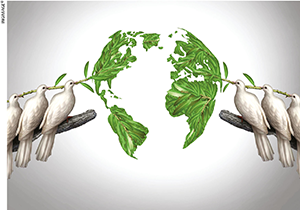NATIONAL RECONCILIATION
SEEKING LONG-TERM RESOLUTIONS
Pursuing mutual accommodation rather than confrontation – Dr. Jehan Perera

When the government declared its intention to withdraw from Sri Lanka’s co-sponsorship of the UN Human Rights Council (UNHRC) Resolution 30/1 of 2015 in February 2020, it may have been hoping that this would be the end of the matter. However, this was not to be.
The UN High Commissioner for Human Rights’ report on Sri Lanka was more intense than anticipated. In the report, the high commissioner states that the country’s disregard for its commitments should not be an excuse for others to follow suit. Its recommendations include calls for targeted economic and travel sanctions on those suspected of human rights violations.
In addition, the report recommends the launch of criminal proceedings in the International Criminal Court (ICC) and an international mechanism to gather evidence.
And countries are invited to take independent action against those deemed to be human rights violators on the basis of universal jurisdiction. A possible consequence of this includes opening the floodgates to a host of lawsuits filed by aggrieved individuals and human rights organisations.
Therefore, the high commissioner’s report cannot be ignored but must be responded to with due attention to detail.
Since former UN Secretary-General Ban Ki-Moon’s visit in May 2009 a few days after the 26 year war came to its bloody termination, Sri Lanka has featured in the UNHRC’s formal discussions – it has even taken centre stage at times. Three resolutions on the nation were passed under acrimonious circumstances with Sri Lanka winning the first one but losing the next two.
As the country became globally known for its opposition to revisiting the past, sanctions and hostile propaganda against it mounted. It was only after the Sri Lankan government agreed to cosponsor a fresh resolution in 2015 that the clouds began to dispel.
The administration’s initial proposal to establish a national commission of inquiry as part of its indigenous reconciliation initiative to deal with human rights violations has not earned a positive response from the human rights community.
Global organisations standing for the principles of international human rights will act according to their mandates. This entails seeking the intervention of international judicial mechanisms or promoting hybrid international and national joint mechanisms in countries where legal structures have not ensured justice.
On the other hand, the government has already commenced the reparation process by establishing the Office for Reparations and allocating a monthly sum of Rs. 6,000 to those who obtained Certificates of Absence (for relatives) from the Office on Missing Persons. This process of compensation can be fast tracked, broadened and improved.
There is also the possibility of amnesty for suspected LTTE members who have been detained without trial and in some cases, without being indicted for more than 10 years.
The government can also seek the assistance of the international community and India in particular to develop parts of the country affected by the war – similar to the US’ Marshall Plan to rebuild parts of Europe destroyed by the war. Resettling those displaced by war, and providing housing and livelihoods, would be priorities.
Member countries of the UNHRC need to be convinced that the government’s actions will advance the national reconciliation process to vote to close the chapter on Resolution 30/1 in March.
As the representative of a sovereign state, the government cannot be compelled to either accept international mechanisms or prosecute those it does not wish to. Unlike in 2012 and 2013 when it lost the UNHRC votes, the balance of global power has since shifted, and its allies China and Russia are much more important on the global stage.
However, a confrontational strategy would still pit Sri Lanka against powerful countries and those with courts that practice universal jurisdiction so this is best avoided.
It’s likely that the government’s response to attempts to compel the nation to traverse a path it rejects will be strong. This would also be the expectation of most people who are opposed to excessive global intervention in the country’s internal affairs.
However, a strong response report does not preclude the government from reaching an accommodation with the UNHRC on the issue of following up to its Resolutions 30/1 of 2015 and 40/1 of 2017.
This would be a better strategy than the full-scale confrontation followed between 2011 and 2014, which proved to be costly.




